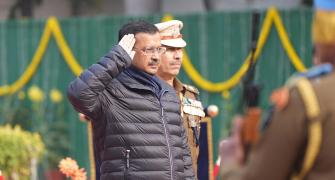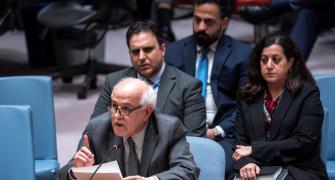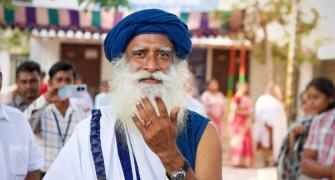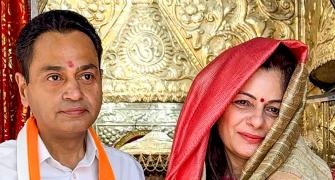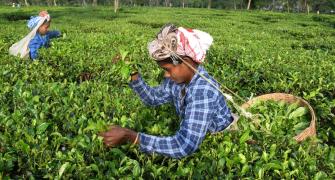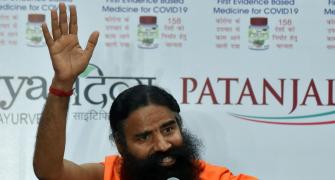Sino-Indian relations over the last year or so have been characterised by much verbal hype and rhetorical posturing. A few weeks ago in St Petersburg, China's President Hu Jintao and India's Prime Minister A B Vajpayee were quoted as talking about an 'Asian century'.
Zheng Ruixiang, former Chinese consul in Mumbai, points out that the 'Asian century' catchphrase was coined way back in the early 1980s by the former leader of the Communist Party of China, Deng Xiaoping. "It was Deng's view that Asia could only develop if both China and India became strong and developed. Today, both India and China face similar problems of unilateralism and hegemonism in a unipolar world. We must jointly defend the rights of developing countries."
But other experts are far more sceptical about such feel-good, 'anti-hegemonic' slogans. While a majority of public officials and journalists on both sides of the border revel in talk of hardware-software collaboration and the importance of the principles of 'mutual accommodation and understanding', mutual suspicion and misunderstanding more accurately describe bilateral relations as they stand, according to Professor Zhang Mingqiu of the Centre for International Studies at Peking University.
It is believed that the focus of the prime minister's visit will be improving economic co-operation, specially bilateral trade. There is also a sense that eventually economic pragmatism will override political disputes, that Bangalore and Shanghai, rather than New Delhi and Beijing, will be the new determinators of the topography of Sino-Indian ties.
Prof Zhang warns that such optimism is premature. "Relationships that have for so long suffered from miscommunication and suspicion cannot be improved that much by just one visit," he says. "We shouldn't underestimate the extent to which political differences are still likely to hinder greater economic co-operation. For example, there is still not much progress on the IT front. Many Indian companies, like Wipro, still appear to be very cautious about the Chinese market."
Indeed, recent Indian fears of Chinese involvement in hi-tech industries being linked with espionage show the extent to which the two countries still view each other as rivals rather than collaborators. India's anti-dumping policies are also seen in Beijing as aimed at China. "India must stop viewing China as a threat and see her as an opportunity," says Zheng.
These economic problems, however, pale in comparison to the political disputes that remain unresolved. The clarification of the Line of Actual Control continues to move forward in gasps, more stalled than moving. China still does not recognise Sikkim as part of the sovereign territory of India, which deepens suspicions in India about Chinese intentions.
On the other side of the equation, the 1998 Indian nuclear tests and subsequent remarks by some Indian officials implying that China is the real perceived security threat haven't helped create waves of goodwill either. All these are very real and deeprooted points of contention. Of course, China's 'special' relationship with Pakistan only complicates matters.
Even the favoured anti-hegemony common ground is only skin-deep. Below the surface, the improved relationship between India and the US has led to fresh worries. Says Prof Zhang, "There has been talk here of fears of an Indo-American alliance. Of the Americans' desire to establish an Asian NATO, including India, Japan, South Korea, etc, but excluding China. These kinds of security concerns cannot simply be overriden by economic pragmatism."
According to Rong Ying of the China Institute for International Studies, a Beijing-based foreign ministry think-tank, part of the reason why the Sino-Indian relationship continues to be fragile despite recent signs of the political will to build bridges is the continued lack of information about each other, which breeds misunderstandings and pepetuates mistrust.
This is not merely a rhetorical claim. As Rong points out, there is only one accredited Indian journalist in Beijing. News of India does not exactly hog the headlines in China either. As a result, the perception of India amongst ordinary Chinese people ranges from the weird to the wary. Hindi films, not the most accurate portrayals of India society, are the chief source of information about India for most Chinese. "I always wonder if all the people in India can sing and dance," muses a student at the Beijing Broadcasting Institute.
"What's the first thing that comes to your mind when you think of India?" I ask a newspaper vendor in Wangfujing, the heart of Beijing's bustling shopping district. "Ummm... there are lot of earthquakes, floods, and natural disasters there," comes the reply.
"Do you know that the Indian prime minister will be visiting China soon?" "No," she shakes her head ruefully. Then wondering if her ignorance may be construed as rudeness, she adds hastily, "But I welcome him."
Turbans, religion, poverty: these were the images that were talked about time and again as I spent an afternoon quizzing people at random. Some taxi drivers, usually the most sage of political commentators, waxed eloquent about the fact that both countries are ancient civilizations, have large populations, and need to develop to become truly strong. "We should forget about our past. We should work together," said one.
Unfortunately, this is easier said than done.
Compared to the hype and hoopla that most Indian newspapers and TV channels have displayed over the last couple of weeks, the media here has been far more cautious in their evaluation of the visit. Far from having daily analyses and updates, the papers have ocassionally carried carefully worded repetitions of official cliches. The China Daily, for example, has carried small items taken from Xinhua (the national news agency) every two to three days over the last fortnight, chanting the slogan of 'mutual understanding and mutual accommodation' dutifully, if somewhat mindlessly.
This is, of course, partly because Chinese media are controlled by the government. Pre-event coverage tends to be more analytical; analyses, however, are not part of the usual media repertoire in China. When I inquired about what kind of live coverage CCTV (China Central Television) was planning for the visit, I was told that CCTV never covers such events live. The story is only served up later, edited and sanitised; repackaged with the embarrassing or ugly bits left out.
The official Chinese line on the visit (the only one reported in the local media) is that bilateral ties are on the right track and outstanding issues can be resolved if both sides adhere to the "principles of consultation based on equality and mutual understanding".
On June 17, Xinhua quoted a foreign ministry spokesperson as saying: "The steady growth of Sino-Indian ties has maintained a good momentum in recent years with a frequent exchange of high-level visits and continuous, intensified exchanges and co-operation in various fields." While such sentiments more or less sum up the synchronised voices of diplomats and officials on both sides of the border, it remains an enigma how, if high-level visits have been so frequent, this is the first time in 10 years that an Indian prime minister is visiting China.
Are we then to assume that Sino-Indian relations and all the genuine work that has gone into getting them somewhat back on track can be reduced to nothing but stirring slogans and empty rhetoric?
Certainly not. Politics and rhetoric are Siamese twins and rhetoric is important. Positive sounds are better than no sounds at all. The challenge lies in converting sound to action. And that is the formidable task that awaits Prime Minister Vajpayee and President Hu. Bridging the Himalayas is no easy day's work and experts agree that it is likely to be a slow, tortuous process.
But while it's probably too early to pop the champagne, perhaps the prime minister's visit will result in chilling the bottle in anticipation.

